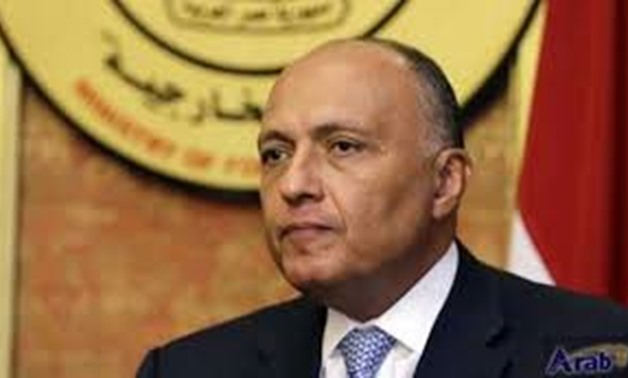------------------------------------------------
CAIRO – 23 June 2020: The Arab League announced, Tuesday that Egypt and Sudan water security is an integral part of the Arab national security.
In its 14-article final statement, the emergency Arab League Council meeting at the level of Foreign Ministers, refused any action that affects the rights of all three countries sharing the Nile waters. The minsters expressed their serious concern regarding the stalling of the Renaissance Dam negotiations.
On Sunday, Egypt’s Minister of Foreign Affairs Sameh Shoukry accused Ethiopian officials of stoking antagonism between the countries, during an interview with the Associated Press.
“Egypt wants the United Nations Security Council to undertake its responsibilities and prevent Ethiopia from starting to fill its massive, newly built hydroelectric dam on the Nile River in July amid a breakdown in negotiations,” Sameh told AP.
"The responsibility of the Security Council is to address a pertinent threat to international peace and security, and certainly the unilateral actions by Ethiopia in this regard would constitute such a threat," the minister clarified.
Ethiopia announced Friday that it would begin filling the dam’s reservoir in July even after the latest round of talks with Egypt and Sudan failed to reach a deal governing how the dam will be filled and operated.
Shoukry warned that filling the reservoir without an accord would violate the 2015 declaration of principles governing their talks — and rule out a return to negotiations.
The Arab League final statement also refused and condemned all sorts of foreign intervention in Libya warning against the longevity of the ongoing conflict.
The statement first article emphasized adherence to all previous decisions of the Arab League Council on Libya, including the latest decisions issued by the Arab Summit in Tunisia last year.
The second article of the statement stressed on Libya’s unity, sovereignty, territorial integrity, stability, and the welfare of its people and their right in democratic future. It also stressed the need to work to restore the Libyan institutions role in serving the Libyan people away from any external interference.
In its third article, the Arab League final statement highlighted the importance of reaching a political solution in Libya, along with supporting the Libyan political agreement signed in Skhirat and affirming the role of all legitimate institutions emanating from it.
Article number four emphasized the central and essential role of the Libyan neighboring countries and the importance of coordination among them to end the Libyan crisis.
Number five, the Arab Council of Ministers stressed its rejection and necessity of preventing external interventions of all kinds in Libya, as it facilitates the movement of foreign terrorists into Libya, as well as violating international resolutions on the arms embargo that threaten the security of the Libyan neighbors and the region.
The statement explained in the sixth article that reaching a political settlement between Libyans parties is the only solution to return security and stability to the country, and to eliminate terrorism.
And in the seventh article, the final statement demanded the withdrawal of all foreign forces on the Libyan territories, including the Libyan territorial waters. It also warned against the consequences of continuing military escalations in order to avoid complicating the conflict.
In its speech during the meeting, Shoukry said that Egypt will not hesitate to take every measure to prevent Libya from falling under the control of terrorist groups and armed militias.
Shoukry noted that Cairo was keen to work through all the diplomatic means to bring the views of different Libyans together and was involved in all the international initiatives aimed at achieving a political settlement in Libya, including the Libyan-Libyan political initiative "Cairo Declaration" launched on June 6.
He confirmed Egypt's keenness on the achievement of Berlin's political and economic resolutions, as well as the (5 + 5) resolution that will put in place the agreed security and military arrangements.
He stressed Egypt's active support and coordination with the efforts of the United Nations.
Shoukry also asserted the importance of working to reform the Libyan economy, through reforming the institutions under the parliament’s supervision and activating the Oil Corporation and the Central Bank in a framework of transparency and fair distribution of wealth.
The Egyptian minister warned of the consequences of remaining foreign interventions on the Libyan territories to support terrorist groups and militias by transferring foreign mercenaries and terrorists from Syria to Libya in a way that destabilizes Libyan internal security and represents a grave threat to Arab national security.
On the same day of June 19, Egypt called the United Nations Security Council (UNSC) to intervene in the Ethiopian Renaissance Dam issue, asserting the importance of continuing the negotiations between Egypt, Ethiopia and Sudan in order to reach a fair and just solution for all three countries.
Egypt stressed the need to prevent any unilateral measures that might affect the chances of reaching a balanced agreement.
Egypt's request to the Security Council was based on Article 35 of the United Nations Charter, which allows member states to alert the council to any update that might threaten the international peace and security.
In its 14-article final statement, the emergency Arab League Council meeting at the level of Foreign Ministers, refused any action that affects the rights of all three countries sharing the Nile waters. The minsters expressed their serious concern regarding the stalling of the Renaissance Dam negotiations.
On Sunday, Egypt’s Minister of Foreign Affairs Sameh Shoukry accused Ethiopian officials of stoking antagonism between the countries, during an interview with the Associated Press.
“Egypt wants the United Nations Security Council to undertake its responsibilities and prevent Ethiopia from starting to fill its massive, newly built hydroelectric dam on the Nile River in July amid a breakdown in negotiations,” Sameh told AP.
"The responsibility of the Security Council is to address a pertinent threat to international peace and security, and certainly the unilateral actions by Ethiopia in this regard would constitute such a threat," the minister clarified.
Ethiopia announced Friday that it would begin filling the dam’s reservoir in July even after the latest round of talks with Egypt and Sudan failed to reach a deal governing how the dam will be filled and operated.
Shoukry warned that filling the reservoir without an accord would violate the 2015 declaration of principles governing their talks — and rule out a return to negotiations.
The Arab League final statement also refused and condemned all sorts of foreign intervention in Libya warning against the longevity of the ongoing conflict.
The statement first article emphasized adherence to all previous decisions of the Arab League Council on Libya, including the latest decisions issued by the Arab Summit in Tunisia last year.
The second article of the statement stressed on Libya’s unity, sovereignty, territorial integrity, stability, and the welfare of its people and their right in democratic future. It also stressed the need to work to restore the Libyan institutions role in serving the Libyan people away from any external interference.
In its third article, the Arab League final statement highlighted the importance of reaching a political solution in Libya, along with supporting the Libyan political agreement signed in Skhirat and affirming the role of all legitimate institutions emanating from it.
Article number four emphasized the central and essential role of the Libyan neighboring countries and the importance of coordination among them to end the Libyan crisis.
Number five, the Arab Council of Ministers stressed its rejection and necessity of preventing external interventions of all kinds in Libya, as it facilitates the movement of foreign terrorists into Libya, as well as violating international resolutions on the arms embargo that threaten the security of the Libyan neighbors and the region.
The statement explained in the sixth article that reaching a political settlement between Libyans parties is the only solution to return security and stability to the country, and to eliminate terrorism.
And in the seventh article, the final statement demanded the withdrawal of all foreign forces on the Libyan territories, including the Libyan territorial waters. It also warned against the consequences of continuing military escalations in order to avoid complicating the conflict.
In its speech during the meeting, Shoukry said that Egypt will not hesitate to take every measure to prevent Libya from falling under the control of terrorist groups and armed militias.
Shoukry noted that Cairo was keen to work through all the diplomatic means to bring the views of different Libyans together and was involved in all the international initiatives aimed at achieving a political settlement in Libya, including the Libyan-Libyan political initiative "Cairo Declaration" launched on June 6.
He confirmed Egypt's keenness on the achievement of Berlin's political and economic resolutions, as well as the (5 + 5) resolution that will put in place the agreed security and military arrangements.
He stressed Egypt's active support and coordination with the efforts of the United Nations.
Shoukry also asserted the importance of working to reform the Libyan economy, through reforming the institutions under the parliament’s supervision and activating the Oil Corporation and the Central Bank in a framework of transparency and fair distribution of wealth.
The Egyptian minister warned of the consequences of remaining foreign interventions on the Libyan territories to support terrorist groups and militias by transferring foreign mercenaries and terrorists from Syria to Libya in a way that destabilizes Libyan internal security and represents a grave threat to Arab national security.
On the same day of June 19, Egypt called the United Nations Security Council (UNSC) to intervene in the Ethiopian Renaissance Dam issue, asserting the importance of continuing the negotiations between Egypt, Ethiopia and Sudan in order to reach a fair and just solution for all three countries.
Egypt stressed the need to prevent any unilateral measures that might affect the chances of reaching a balanced agreement.
Egypt's request to the Security Council was based on Article 35 of the United Nations Charter, which allows member states to alert the council to any update that might threaten the international peace and security.

